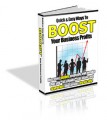Salespage Snapshot

PLR Ebook Sample Content Preview
401(k)
The 401(k) is a retirement plan implemented and provided to employees by their employer as a means to save for their retirement. Not only do many employers contribute to the employees 401(k) along with employee contributions (this is known as matching), but the contributions are pre-tax contributions; in other words the deduction is taken prior to calculating the state and federal taxes due on the wages. This helps not only the employee, but also the employer.
There are several variations of the 401(k) and depending upon your employer’s status as a small business, and their ability to fund a 401(k), you may operate under a SIMPLE 401(k), a traditional 401(k), or The Safe Harbor 401(k). All the plans vary as to their contribution limits, the employers required matching contributions, and the level of administration and IRS reporting that must be factored into the plan upkeep. Let’s take a look at each of the plans, and discuss some of the advantages and disadvantages of each.
The SIMPLE 401(k) is best suited for small businesses that have a reliable earnings stream. In other words, their cash flow and earnings level are fairly steady and reliable, and they want to establish an easily controlled method for providing for retirement funding. Quite often, many of the family members will participate in the 401(k) as a way to fund their own retirement, and offset some of the taxable income from the family business. The disadvantage in operating this type of retirement account lies in the fact that contributions made on behalf of the employee by the employer are not optional, and some form of contribution must be made each year.
The traditional 401(k) is the most often avoided plan by small to medium sized businesses, simply because of the massive reporting requirements, and the compliance testing that must be done each year. The administrative costs for the traditional 401(k) for a company of about 10 employees costs around $2000 per year to administer, and that doesn’t include the setup costs or the costs of loan features. In addition to the optional features costs, there is the cost of offering many investment choices. Most of the 401(k) plans for small businesses that were surveyed had a much better rate of participation as well as lowered plan costs when only a few options were offered, instead of 10 or more.
The compliance testing that must be done with the traditional 401(k) are quite complex, and require much involvement by the accounting or payroll department of the business. Today, many small businesses outsource their payroll function, and include the 401(k) plan administration as one of the outsourced functions also. The greatest advantage to the small business is that the business is not required to contribute to the plan, unless there is a significant imbalance in the contributions of the highly compensated employees versus the lesser paid employees.
Other Details* Sales Page: Included, HTML, MS Word Doc
* File Format: MS Word Doc, PDF
* Number of Pages: 82
* Included Graphics: Ecovers, PSD
* Download File Size: 1,545 KB













